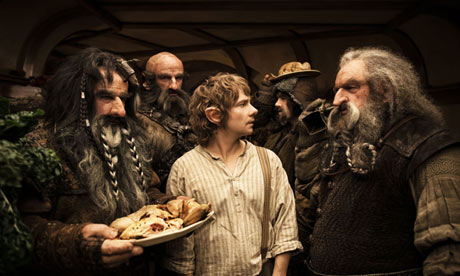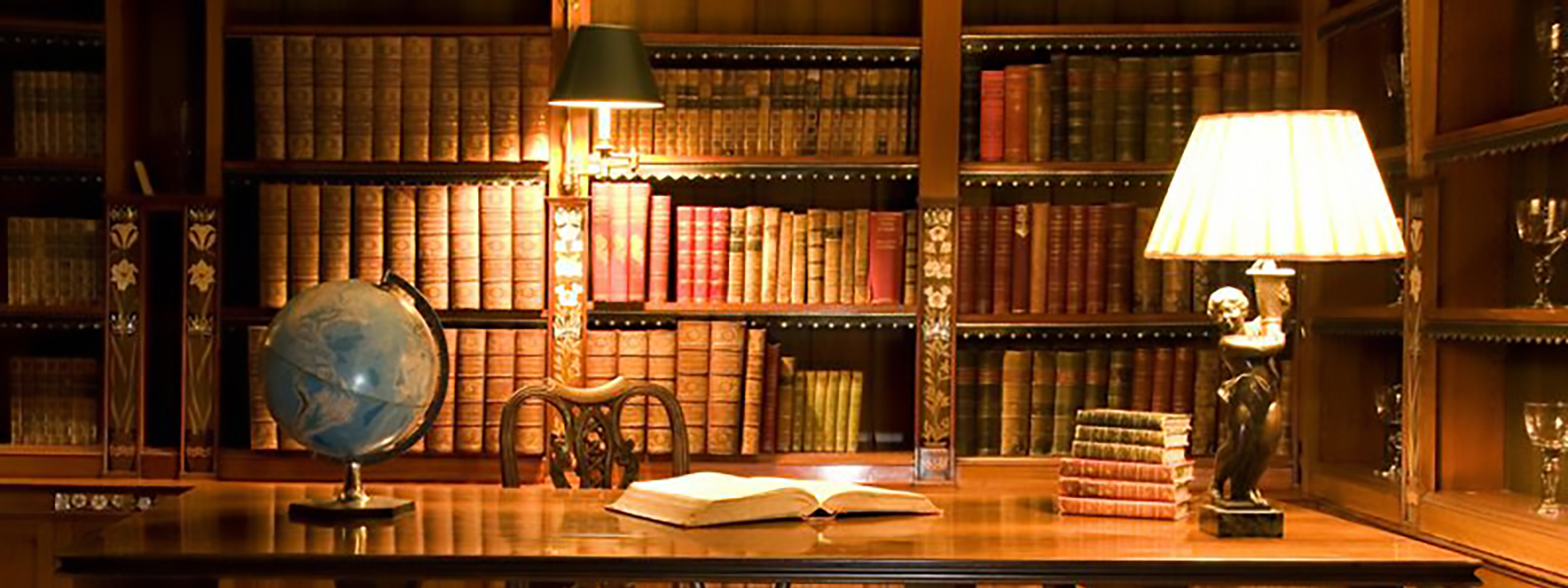Tolkien and The Hobbit
http://www.thehobbit.com

Unlike many of my friends who have read The Hobbit, and The Lord of the Rings half a dozen times each, taken or taught university courses on Tolkien’s oeuvre, and know the history of Middle Earth as described in The Silmarillion well enough to score a 5 on the AP test, should such a test ever exist (and given the fervour surrounding Tolkien’s work, I half expect that day to come), I know almost nothing of this world of Hobbits, Orcs, Elves and the like. I read The Hobbit for the first time last week, and reluctantly saw the film, given its length and the fact that three times I have tried to watch the first Lord of the Rings film and have each time fallen asleep about an hour in, despite efforts nearly as valiant as dear Frodo’s. As much as I’ve admired Tolkien as a man and in what he accomplished, I have never been able to get into the stories themselves. Part of this is a personal predilection against fantasy. I realise that all fiction is in some way fantasy. But I’ve always been of the opinion that real life is strange enough; truth is stranger than fiction; one need not resort to the preternatural or the realm of fantasy in order to come up with a decent story. There are enough mysteries in life as it is. Similarly, on a theoretical level, I respect that fantasy is not about escape, though some use it for this or see it this way, but a very significant tool for taking a step back from our own world, entering into one strangely different, so that we can gain a deeper understanding of our world afresh. Tolkien’s work is remarkably insightful in this regard. But still, I just cannot get as excited by these tales as most people I know. A pox upon me. Nonetheless, here are some elements I did manage to appreciate.
First, I have long marvelled at Tolkien’s stability as a person, despite being one of the greatest writers of the modern era—a time notorious for the tortured writer, drinking himself to death, or committing suicide, often in especially brutal ways. Gertrude Stein famously remarked to Hemingway, ‘You are all a lost generation.’ Yet it does not seem Tolkien was lost in this way, or at least he is an indication of how ‘not all who wander are lost.’ This is particularly remarkable given Tolkien’s experience in the trenches of the first world war. He saw thousands in his battalion hurled into direct machine gun fire time and again. He spent his days in the barren wasteland of no man’s land, breathing in the stench of carrion, facing death in every possible way. By the end, almost every single one of his friends from Oxford was dead. Just imagine that for a moment—every one of your friends being dead. The horror he faced cannot be underestimated. And yet he returned to England and settled into life with his wife, teaching, writing, and living a rather quiet, normal existence, almost as if nothing had happened. Think of this in contrast to the state in which many other veterans of that war and more recent wars have returned and what the consequences of that has often been.
Yet it seems Tolkien was committed to being the voice of those fallen friends of his, the great kindred minds of his group, the T.C.B.S. In his last letter to Tolkien, his good friend G.B. Smith writes: ‘May you say the things I have tried to say long after I am not here to say them.’ And it seems he took this to heart. Somehow he was able to turn this harrowing experience into beautiful art. It is not to say that Tolkien did not struggle and was not dark. His journals were primarily a means of venting his frustration, and some of them can be very dark, even misleadingly so. But he was able to take up his noble cause of trying to create a mythology for England. The mission to carry on the work of the T.C.B.S also manifested itself later on in the Inklings, notably including Lewis and Chesterton, who had a tremendous impact on modern Christianity in Britain. The joy he found in tending the gardens of Middle Earth and caring for his creation, as well as the friendships he relished are a partial explanation for this. Consider C.S. Lewis’ reflection on his meetings with Tolkien: ‘Those are the golden sessions […] when our slippers are on, our feet spread out towards the blaze and our drinks at our elbows; when the whole world and something beyond the world, opens itself to our minds as we talk; and no one has any claim or responsibility for another, but all are freemen and equals as if we had first met an hour ago, while at the same time an Affection mellowed by the years enfold us. Life—natural life—has no better gift to give’ (The Four Loves).
Another explanation must be that he was a devout Catholic, attending daily mass as his mother had instilled in him. It is often said that Tolkien’s mythology does not mention God, but that it is imbued with God, and that it presents a sacramental worldview. In the very act of creating a mythology, Tolkien likely gained a sense of being a co-creator, not in a hubristic way, but in a way in which he came to understand how one must be a steward of one’s world, being a vigilant caretaker. And indeed, Tolkien didn’t really see himself as making up a mythology or an allegory, but doing justice to something that he had loved into being in a very real way. His world also indicates something Catholic in it’s very real sense of the mystery of evil, and a yet striving for virtue, though not in a way that one could construct a solidified moral code. In many ways this reflects an effort at confronting the complexity of power and evil in our world, though not in a facile allegory with a clear and distinct meaning to be gleaned. His work does not have a moral, and is not moralistic.
In The Hobbit there is a strong ecumenical current, where people of different races experience friction but also endeavour to work together. The dwarf king, Thorin, is reluctant to receive help from the elves because they failed to help the dwarves when they most needed it. There is definite tension, but they manage to work together on some level. Similarly, Thorin is very critical of Bilbo and his meek hobbit ways, but then is saved by Bilbo. This is one of the most touching moments of the film, when Thorin embraces Bilbo and admits how wrong he was about him. Bilbo even surprises himself in risking his life for a dwarf and for their cause. One also senses the wisdom of Gandalf in assembling this group in the first place.
A further theme of great importance is Bilbo’s character development. Although one cannot say that Bilbo is Tolkien, I cannot help but think that his own experience in the first world war influences the theme of someone meek finding himself in a very dangerous situation, and having to rise to that occasion, summoning great inner courage. One of the reasons why Bilbo is so likeable is that he embodies a particular Catholic ethos: ‘Take O take me as I am; summon out what I shall be.’ Bilbo is aware of who he is, his faults, yet is proud to be a Hobbit. while also allowing himself to grow in extraordinary ways. This is not simply pollyannaish self-improvement. Part of what gives Bilbo increased courage is the experience of killing. This is unsettling, to say the least. Perhaps Tolkien is trying to grapple with his own experience of courage and growth while also being complicit in great violence. Perhaps Tolkien’s experience of the first world war was also one of a ‘there and back again.’ He does indicate in his own words that he saw average British men find extraordinary courage in themselves in the trenches. ‘The Hobbits are just rustic English people, made small in size because it reflects the generally small reach of their imagination—not the small reach of their courage or latent power. […] I’ve always been impressed that we are here, surviving, because of the indomitable courage of quite small people against impossible odds.’ As David Foster Wallace came to understand later in his career, there has to be a way for literature to get out of the muck of meaninglessness that it has been stuck in for far too long, and the popularity of Tolkien’s work today testifies on behalf of hope for the human spirit.
All of these elements I admire profoundly.
An interesting question raised by Allison Milbank, who specialises in theology and literature, is whether Tolkien would have approved of the grandiose, epic quality of the films. She suggests that the hollywoodised quality of the films is not true to the more organic quality of the books, especially The Hobbit. She suggests that Tolkien might have preferred something shot more like a Dogma film. It certainly is true that The Hobbit as a film is portrayed with much more of the tone of The Lord of the Rings consistent with that kind of epic gravitas and darkness, as opposed to the rather quaint quality of the book, which reads much more like a children’s book than an epic tale. Tolkien certainly darkened the mood and tone in the later books, which is darkened and enlarged further by Peter Jackson’s direction. Jackson likely sought to make the films more consistent in this regard, as well as more consistent with his own interpretation of the stories. A question worth asking is whether there is something contextual in this interpretation of Tolkien’s mythology. Is his magnification of the stories simply playing into a film industry and larger cultural trend wherein everything has to be big and bombastic? Or is he trying to be faithful to Tolkien’s intention that others take up and continue the work of building a mythology that enhances life in the way that all great art does?
So, as I confront an enormous stack of final exam papers that I must grade, I may find myself hoping, as naive as it may be, that on the back of one of the papers, I may scribble something as promising as ‘In a hole in the ground there lived a hobbit.’ Not likely, so I won’t plan on it. But then again, neither did Tolkien.
